Burano is an island located in the Venice Lagoon and is known all over the world for its centuries-old lacemaking, as well as for its colorful houses, thanks to which it looks like it has been drawn by a painter.
In addition to this, it offers many other things to see, which we are now going to discover together.
Together with Murano and Torcello, it is one of the most famous islands of Venice.
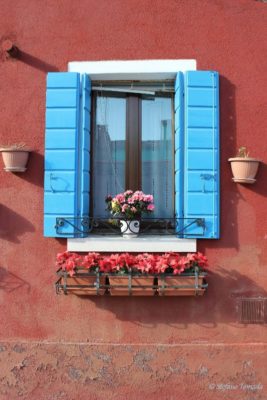
Glimpses of Burano, flowered window
The town is divided into five districts connected by bridges: San Martino Destro, San Martino Sinistro, San Mauro, Giudecca and Terranova.
In this article we are going to advise you on the most interesting things to see in Burano and the organized activities to attend.
Let’s go!
Table of Contents
- History of Burano
- How to get to Burano
- Excursions to Venice and the islands of the Lagoon
- What to see in Burano
- What to eat
History of Burano
It is said that the inhabitants of the roman village of Altino, a town located a few kilometers far from the Marco Polo airport of Venice, took refuge in the nearby islands of the Lagoon to escape the arrival of the barbarian tribes, in particular Huns and Lombards.
They called the islands by the names of the gates of access to Altino: Ammiana, Burano, Costanziaco, Mazzorbo, Murano and Torcello.
The name Burano comes from Porta Boreana, so called because it is located to the north-east and therefore in the direction in which the bora wind blows.
The first settlement consisted of stilt houses with walls of reeds intertwined and plastered with mud. The floor instead was in clay.
Subsequently, the stilt houses were replaced by masonry buildings.
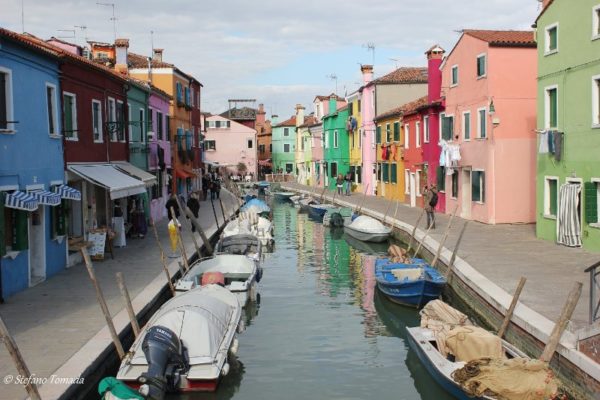
Glimpses of Burano, walking along the canals and bridges
How to get to Burano
The island of Burano can be reached by waterbus from Venice, Punta Sabbioni and Treporti. For our convenience we have chosen the latter solution.
Once left the car in the paid parking lot adjacent to Marina Fiorita and bought the tickets at the reception, we headed to the docking point.
The direct journey takes about a quarter of an hour and is covered by line 12 of the Azienda del Consorzio Trasporti Veneziano (ACTV).
During the summer, however, also the seasonal line 14 is operative.
In addition to those listed, there are also other lines serving Burano both from Venice and from other islands of the lagoon, but their route involves the change of vehicle.
In Venice you can take the waterbus at the Fondamente Nove stop.
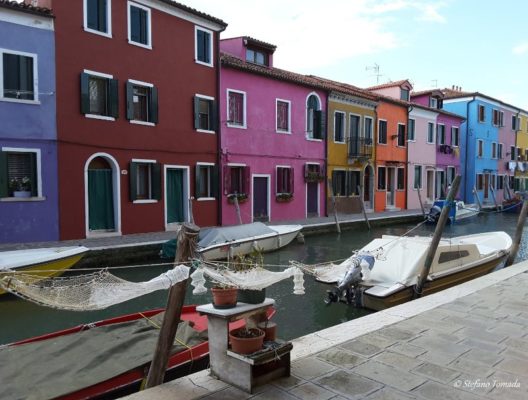
Glimpses of Burano, walking along the canals
Excursions to Venice and the islands of the Lagoon
To visit the Venice Lagoon with a multilingual guide and without the need to care at all the organization stuffs, we personally recommend you three different activities:
Trip to Burano, Murano and Torcello
This tour starts from the centre of Venice, where there are two meeting points available.
After boarding the boat, you will head to the three most important islands of the Venice Lagoon. In each of them, after the explanations of the guide, you will have 1-hour free time for the visit.
Moreover, in Murano, famous worldwide for the glass manufacture, you will enjoy a glass blowing demonstration included in the price of the ticket.
After visited Murano you will sail to Burano and finally to Torcello. The latter is the most early inhabited island of the lagoon, and for many years it had a population greater than Venice itself.
If you want to read more information, checking the availabilities or booking the tour, have a look at this link Trip to Burano, Murano and Tocello.
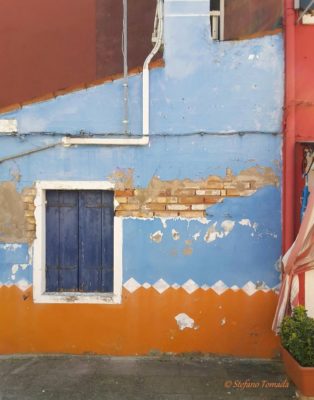
Glimpses of Burano, walking along the narrow streets
Trip to Murano and Burano
We recommend this option if you have less time to dedicate at the visits. In fact, this tour is similar to the previous one, but it does not include the Torcello Island.
You will be accompanied by an English speaking person, but he will not be a tourist guide in this case. For more information, check this link Trip to Murano and Burano.
Venice Lagoon Sightseeing Boat
A great alternative to the above tours is offered by the Venice Lagoon Sightseeing Boat. The panoramic terrace of this boat will allow you to enjoy the best views on the canals.
With this ticket you will be able to travel between Venice, Murano, Burano and Torcello as many times as you want, for 1 or 2 days, depending on the option you choose.
In our opinion it is a great opportunity if you have a lot of time to spend here and don’t need a guide. Check here for more about Venice Lagoon Sightseeing Boat.
What to see in Burano
Once you get off the vaporetto (waterbus), you are in a green area where the sculpture Attesa di pace by the local artist Remigio Barbaro stands.
Then, after walking along a small street paved in basalt and lined with bars, ateliers and shops you will arrive at the Fondamenta San Mauro: from here you can start the tour of the town.
Everyone can proceed in the direction that inspires him the most, there are no pre-established paths.
Indeed, we recommend you to consciously get lost in the streets that like loopholes penetrate between the houses and emerge in squares and courtyards.
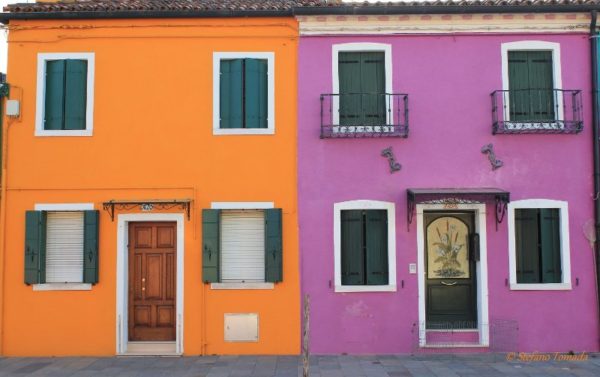
Glimpses of Burano, colorful houses
Obtained thanks to the burial of the main canal, Piazza Baldassarre Galuppi is certainly the beating heart of the town. On the open space there are some valuable buildings.
We started the visit from the church of San Martino Vescovo.
Inside there is a masterpiece on canvas by Gianbattista Tiepolo, La Crocifissione, recently restored to its original shine.
In exchange for a small donation, you can turn on the spotlights that illuminate the painting.
On the back of the church there’s the famous Campanile Storto (leaning bell tower), clearly visible from afar.
Built in the seventeenth century, it is 53 meters high and stands on a square base measuring 6.20 meters on its side. Due to a land subsidence, it is inclined 1.83 meters on its axis.
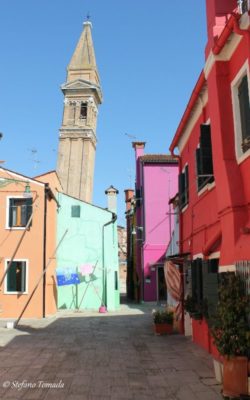
The leaning bell tower of Burano
On the other side of the square we got attracted by two Venetian-style buildings.
The first has housed since 1981 the Lace Museum (closed on Mondays) and in the past was the seat of the Lace School, the other instead houses the premises of the registry office and the civil status of the municipality.
Moreover, in this square there is a well built entirely of Istrian stone.
After having a fish meal inside an inn located in the pedestrian street that starts from Piazza Galuppi, we continue the visit walking among the typical brightly colored houses.
Legend has it that it was the fishermen who painted them in such a way that they could be recognized from afar during periods of absence for fishing.
Actually, the colors served to delimit the properties.
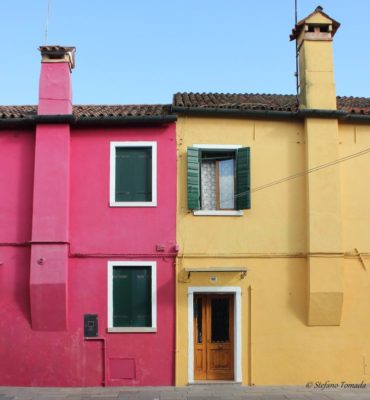
Burano, geometric figures
The most famous house in the village is certainly that of Bepi Suà, painted with many colors and divided into particular geometric shapes.
On the doors of the house old ladies embroider the lace with the use of the tombolo.
On the metal wires adjacent to the windows of the upper floor and in the courtyards the women take advantage of the sunny day to hang out the clothes to dry.
On the windowsills instead beautiful flowers adorn the house. From time to time we cross votive altars dedicated to Our Lady.
Piled up in the courtyards, nets and pots are waiting to be embarked by fishermen.
The shades of the dwellings are reflected in the placid waters of the canals. In Burano there are only three: Rio Ponticello, Rio Zuecca and Rio Terranova.
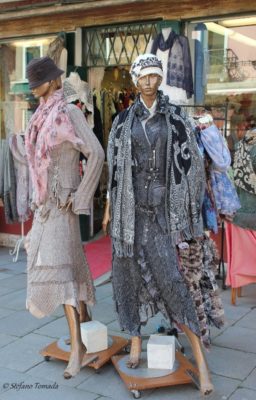
Burano, the city of lace
Along the waterways, docked at high wooden poles, there are small motorboats with the cockpit protected by plasticized sheets.
Seagulls flutter between the wooden poles that delimit the navigable canals in the lagoon. In front of us stands the island of Torcello.
We remain silent to admire the landscape until the sunset reminds us that the time has come to leave the island.
What to eat
Being an island of fishermen, Burano is known for its fish dishes, the most famous of which is undoubtedly the risotto di gò.
It consists of rice cooked and creamed in the broth obtained from the gò, a typical fish of the Venetian lagoon known in the rest of Italy with the name of ghiozzo, gudgeon in English.
In the historic center you will find a wide range of restaurants that offer typical dishes of Venetian cuisine.

0 Comments